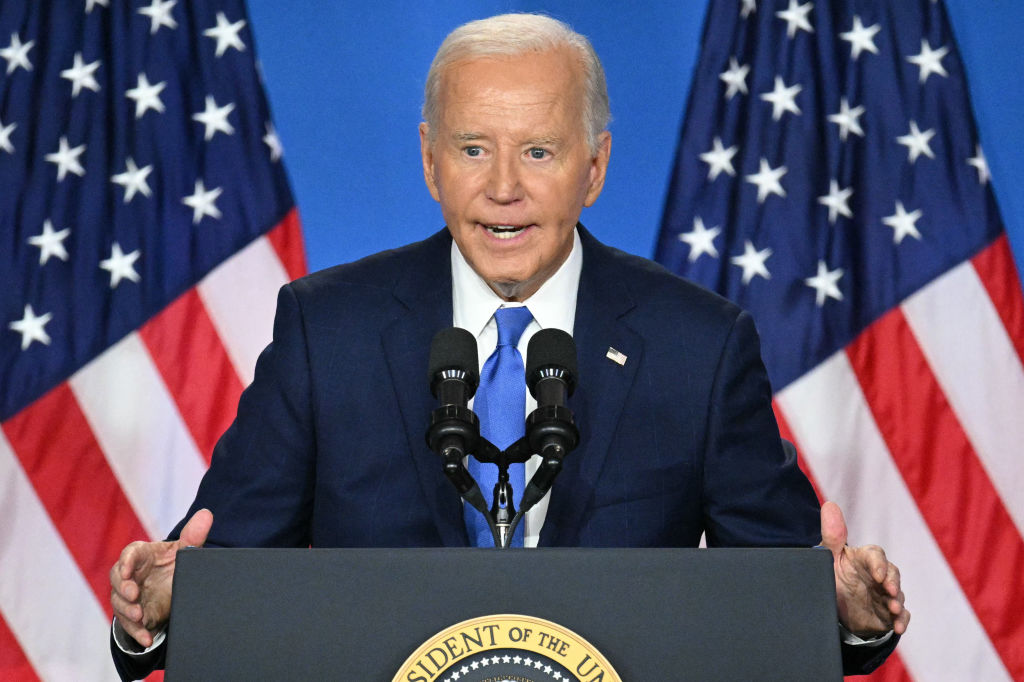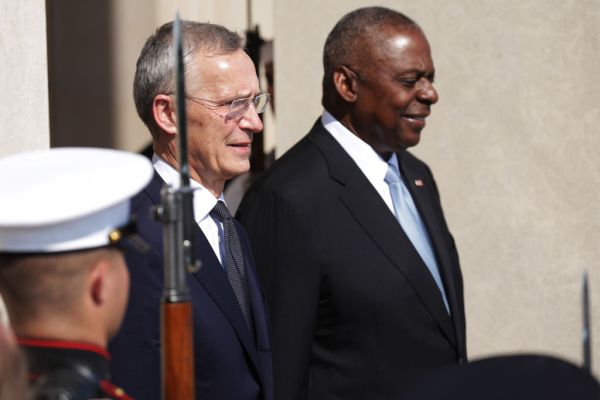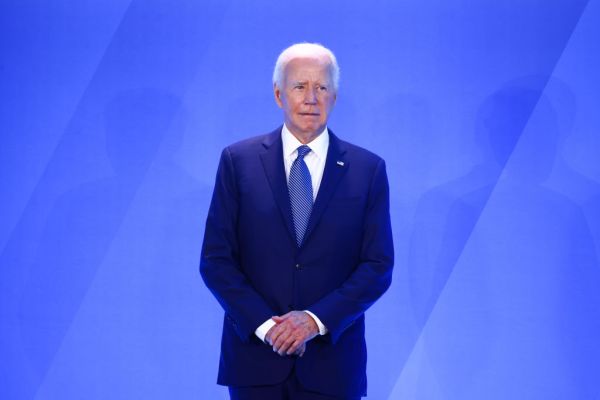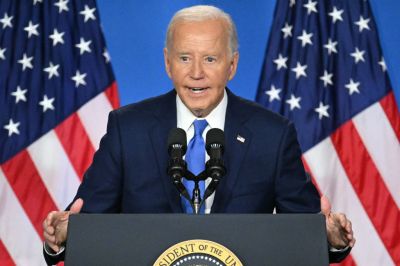Happy Friday! The Killers stopped their concert at London’s O2 arena on Wednesday to show the end of the England vs. Netherlands semifinal game of the European Cup. The crowd watched England score the game-winning goal in the final regulation minute, and—with the game still on the big screen—the band launched into their iconic, crowd-pleasing hit, “Mr. Brightside,” to close out the night.
It’s frankly hard to imagine the transcendence of that moment.
Quick Hits: Today’s Top Stories
- President Joe Biden held a press conference Thursday evening—his first since the debate last month with former President Donald Trump—where he fielded questions from reporters about his candidacy and foreign policy. Biden delivered almost eight minutes of prepared remarks before answering questions for the next 50 minutes. The president stumbled in his very first answer, referring to Vice President Kamala Harris as “Vice President Trump.” The mistake followed a blunder earlier in the day when he referred to Ukrainian President Volodymyr Zelensky as “President Putin.” He defended his staying in the race but conceded, “I think it’s important that I allay fears.” When asked whether he would drop out if his team presented him with evidence that Harris would perform better than him against Trump, Biden said, “No, unless they came back and said, ‘There’s no way you can win,’” adding that “no one’s saying that, no poll has said that.” National polling averages and polls in key battleground states currently have the president losing to Trump. Biden also seemed to give democratic delegates permission to defect. “They’re free to do whatever they want,” he said. “If all of a sudden I show up at the convention and everybody says, ‘We want somebody else,’ that’s the democratic process. It’s not gonna happen.”
- Senate Democrats concerned about Biden’s fitness to be the party’s nominee met with top Biden aides on Thursday, though it’s not clear whether their efforts to assuage the senators’ worries were successful. Sen. Peter Welch of Vermont remains the sole Democratic senator to publicly call for the president to drop out, although Sen. Michael Bennet of Colorado predicted earlier this week that Biden will lose—potentially in “a landslide.” Both senators said their thinking was unchanged after the Thursday meeting. Meanwhile, the number of Democratic representatives calling for the president to step aside nearly doubled from nine on Wednesday to 17 members by Thursday night. Several members called for Biden’s exit after his press conference, and Democratic Rep. Marie Gluesenkamp Perez of Washington, who represents a hotly contested district, seemed to suggest on Thursday that Biden should resign the presidency. “I doubt the President’s judgement about his health, his fitness to do the job, and whether he is the one making important decisions about our country, rather than unelected advisors,” she told a local NBC News affiliate.
- The Defense Department announced on Thursday that it would permanently disassemble the humanitarian aid pier in Gaza, one day after an attempt to fix the damaged pier failed “due to technical and weather-related” issues. “The pier has always been intended as a temporary solution to enable the additional flow of aid into Gaza during a period of dire humanitarian need,” Pentagon spokesman Maj. Gen. Pat Ryder said in a statement. Over the last three months, the U.S. delivered nearly 20 million pounds of aid to Gaza through the pier, which the Pentagon said cost roughly $230 million.
- The Biden administration unveiled new sanctions against Lehava, an ultra-religious nationalist organization based in Israel, for escalating violence in the West Bank—including violence against Palestinian civilians in the region. The organization—whose leader, Ben Zion Gopstein, was previously sanctioned by the U.S. in April—is known for its extremist views, including opposing the presence of Christians and Muslims in Israel. “Lehava’s members have engaged in repeated acts of violence against Palestinians, often targeting sensitive or volatile areas,” State Department spokesman Matthew Miller said in a statement. “The United States remains deeply concerned about extremist violence and instability in the West Bank, which undermines Israel’s own security.”
- Leaders of the U.S., Canada, and Finland announced a trilateral pact on Thursday focused on boosting the production of ships and bolstering their Arctic fleets to counterbalance increased Chinese and Russian presence in the region as melting ice opens up the possibility of commercial and military interests in the region. The agreement—known formally as the Icebreaker Collaboration Effort (ICE) Pact—promises billions of dollars in investment to build polar-class icebreakers. Russia currently operates more than 35 icebreakers, while Canada operates 20 and the United States just two. The new ships would be the first American-made icebreakers built in more than 50 years.
- The U.S. and Germany announced Wednesday that American forces will begin “episodic deployments” of U.S.-long-range missiles in Germany starting in 2026 to “demonstrate the United States’ commitment to NATO and its contributions to European integrated deterrence.” According to a U.S.-German joint statement, the deployments “will include SM-6, Tomahawk, and developmental hypersonic weapons, which have significantly longer range than current land-based fires in Europe.” Russian defense officials decried the move and warned that Russia “will develop a military response.”
- Hungarian Prime Minister Viktor Orbán met with former President Donald Trump at Mar-a-Lago on Thursday night, apparently to discuss how to end the war in Ukraine. “We discussed ways to make #peace,” Orbán wrote on Twitter. “The good news of the day: he’s going to solve it!” Trump responded on Truth Social, writing that “there must be PEACE, and quickly” in this “war that should have never started!” Orbán has endorsed Trump’s reelection bid, and the prime minister has recently met with Ukrainian President Volodymyr Zelensky, Russian President Vladimir Putin, and Chinese President Xi Jinping to discuss a peace process.
- The Consumer Price Index (CPI) declined slightly in June, the Bureau of Labor Statistics reported Thursday, with prices dropping 0.1 percent from May and rising 3 percent annually—the lowest annual inflation rate in three years and lower than May’s 3.3 percent annual increase. June’s inflation was less than economists had predicted and provided another month of improved data, boosting the case for the Federal Reserve to begin cutting interest rates. Fed Chair Jerome Powell acknowledged Tuesday that “elevated inflation is not the only risk we face,” warning of the risk of waiting too long to start bringing rates down.
Politics at the Water’s Edge

WASHINGTON—As the 75th NATO summit wound to a close on Thursday, representatives of the alliance’s member countries gathered to sign a security agreement with the leader of Ukraine.
“I’d now like to turn it over to the president of Ukraine,” President Joe Biden said, “who has as much courage as he has determination. Ladies and gentlemen, President Putin!”
There was shock in the room as Biden moved away from the podium before he darted back with eyes wide. “President Putin?” he said before ceding the podium to Ukrainian President Volodymyr Zelensky. “We’re going to beat President Putin! President Zelensky.”
It wasn’t the last time Biden mixed up a name on Thursday, just a few hours later calling Vice President Kamala Harris “Vice President Trump”—as his advisers in the audience winced—during the opening response of his highly anticipated press conference that capped the summit.
In the wake of Biden’s disastrous debate performance two weeks ago, concerns over the president’s fitness shrouded the landmark meeting of the 32-member alliance. His infirmity—and sinking poll numbers—brought to the fore world leaders’ worries about a potential second Trump administration as the NATO allies moved to institutionalize support for Ukraine.
Since the debate last month, Biden has been under increasing pressure from Democratic lawmakers, donors, and party bigwigs to step aside. As we’ve detailed several times in recent days, the president has attempted to assuage concerns about his age and fitness with a handful of public appearances.
His opening speech at the NATO summit on Tuesday evening was one more test, and his delivery from the teleprompter was without incident—though it did nothing to change the narrative about his poor health, which continued to develop on Wednesday.
He concluded those remarks by taking the rare step of awarding NATO Secretary General Jens Stoltenberg—the former Norwegian prime minister who has served as the head of NATO since 2014—the Presidential Medal of Freedom, the United States’ highest civilian honor. This was the much-lauded Stoltenberg’s last NATO summit as the alliance’s chief as he prepares to pass the torch in October to outgoing Dutch Prime Minister Mark Rutte—who happens to have a reputation as a “Trump-whisperer.”
“I realize—I’ve spoken to your wife—I personally asked you to extend your service,” Biden joked to Stoltenberg, whose term as secretary general was extended four times. “Forgive me.”
Biden asked no forgiveness—and seemed intent on keeping the torch for himself—during his press conference at the end of the summit on Thursday, striking an at times defiant tone when asked about his fitness for office and a bevy of foreign policy issues. His answers meandered and his sentences trailed off, often punctuated by “anyway …” when he realized a thought was getting away from him.
It was, however, a performance much closer to Biden’s norm than last month’s debate. And even as Democratic members of Congress continue to call for him to step aside—including several after last night’s performance—Biden remained unmoved before reporters. “I’m determined on running,” Biden said. “But I think it’s important that I allay fears by seeing me out there.”
And as Charlotte pointed out in a piece on the site this week, Biden’s fitness and electoral chances aren’t simply a domestic political issue:
Several European diplomats privately voiced concerns about Biden’s debate performance, and one senior European official told the New York Times they were “shocked” by Biden’s seeming physical decline at the June G7 summit. Others are worried about the potential ramifications for European security should voters’ concerns about Biden’s age ease Trump’s path to another term. “If they can change the horse, they should,” a European diplomat told CNN, referring to the possibility of Democrats replacing Biden on the November ballot. … Amid this uncertainty, Biden needs to be up to the task of reassuring the alliance and its enemies of America’s continued commitment to European security.
Biden bristled during the press conference at a question that implied his Zelensky-Putin gaffe was part of a pattern that had forced key international allies to “make excuses” for him, which is now “damaging for America’s standing in the world.”
“Did you see any damage to our standing in my leading this conference?” Biden shot back, leaning over the podium slightly. “Have you seen a more successful conference?”
“Well, anyway,” he added, “I thought it was the most successful conference I’ve attended in a long time, and find me a world leader who didn’t think it was.”
The summit was certainly full of geopolitical significance on its own terms, whether or not that was to Biden’s credit. Though Ukraine and Putin’s invasion were no doubt the centerpieces, the alliance also forcefully condemned China as the “decisive enabler” of Putin’s war for sending dual-use technology and propping up the enfeebled Russian economy through trade, the first time NATO has directly tied China to the conflict.
The allies were eager to avoid a repeat of last year’s summit in Vilnius, Lithuania, that left Ukrainian officials publicly frustrated with what they considered insufficient action from the alliance on its path to membership. “The Washington summit is too big to fail,” Sean Monaghan, a visiting fellow at the Center for Strategic and International Studies who worked on NATO issues for the British defense ministry, told TMD.
Though Zelensky clearly wants an explicit timeline for Ukraine’s NATO membership—and he wants it yesterday—the 32 members of the consensus-based alliance provided what seems to be the best they could agree on. “Ukraine’s future is in NATO,” the allies wrote in the summit’s official communiqué. “We welcome the concrete progress Ukraine has made since the Vilnius Summit on its required democratic, economic, and security reforms. As Ukraine continues this vital work, we will continue to support it on its irreversible path to full Euro-Atlantic integration, including NATO membership. We reaffirm that we will be in a position to extend an invitation to Ukraine to join the Alliance when Allies agree and conditions are met.”
The inclusion of the term “irreversible” was the result of months of haggling among allies over how to up the ante on support for Ukraine without going so far as officially inviting the war-torn country to join the defensive alliance bound by a mutual defense treaty. Members settled on an “irreversible” guarantee of eventual membership. “[The term] signals to me that there’s increased momentum among the 32 allies to actually provide concrete, meaningful language to reassure Ukraine in the midst of this fight,” said Douglas Lute, former U.S. ambassador to NATO and a retired U.S. Army lieutenant general who served as a deputy national security adviser to President George W. Bush. “But also, importantly, to send a message to Moscow that this is not something that’s going to be bargained away, and that [Ukraine’s NATO membership] is inevitably, irreversibly an outcome of the war.”
Ukrainian officials, for their part, seemed content with the outcome—or at least had learned to say so publicly, whatever their true feelings. “We are satisfied with the result of the Washington summit,” Andriy Yermak, a Zelensky adviser, said Thursday. “The language of the document is really strong. … The next stop is Ukraine needs to receive the invitation.”
As the alliance looks to the future—including to Ukraine’s potential membership—the prospect of a second term for former President Donald Trump, a NATO skeptic, seemed front of mind in both the negotiated agreements and Stoltenberg’s own statements.
Asked on Wednesday—just a day after Trump told a crowd in Florida he “didn’t know what the hell NATO was” before he took office—about what Trump 2.0 would mean for the alliance, Stoltenberg gave a succinct three-point answer that sounded like one he could deliver in his sleep.
“I expect the United States to remain a staunch and, of course, important NATO ally—just by the fact that the United States is by far the biggest ally—and I expect that for at least three reasons,” he said. He pointed to U.S. security interests and a deep well of bipartisan support for NATO membership. But he also addressed Trump’s main critique of the alliance: that members don’t spend enough on their own defense. “The main criticism from former President Trump, but also from other U.S. presidents, has not been against NATO,” Stoltenberg said. “It has been against NATO allies not investing enough in it. And that has changed.” Indeed, 23 out of 32 members now spend at least 2 percent of their GDP on defense, in line with a goal set a decade ago when only three member states did so. The increase is likely owed to the more urgent threat from Russia over the last ten years.
The alliance has moved in recent months to institutionalize NATO support for Ukraine as the conflict shows no signs of abating. Allies have tried to set spending pledges, have signed multiyear bilateral defense pacts, and, as announced this week, set up a new NATO command in Germany that will be in charge of dispersing allies’ lethal aid to Ukraine and providing Ukrainian troops with additional training. “It’s a sea change in NATO’s role in supporting Ukraine,” Monaghan told TMD. “NATO is now at the center; it was on the periphery.” The U.S. had previously handled the provision and distribution of lethal aid donations.
The caveat, of course, to the efforts to lock in support for NATO is that the consensus-based alliance could see any ally exercise its functional veto at any time. “Some people call this Trump-proofing, but that’s a little crude,” Lute told TMD, referring to the new NATO command. “The idea here, I think, is to be more efficient.”
There are other loose cannons in the alliance, including Hungarian Prime Minister Viktor Orbán, who took the opportunity to visit Trump at Mar-a-Lago on Thursday. “And there could be significant changes among other nations, too,” Lute added, pointing to recent elections in the United Kingdom and France.
But it’s surely the U.S. election that seems most likely to give allies pause: At this point, the options are a president who, perhaps willfully, misunderstands and is disdainful of the whole NATO project or an elderly, if supportive, president for whom getting through a single press conference is considered a feat of strength.
While Biden effortfully completed Thursday’s test, it didn’t stop Democratic Rep. Jim Himes of Connecticut—the ranking member on the House Intelligence Committee—from calling for him to step down Thursday evening.
“We are watching every speech, every rally, every debate, and asking ‘How did he do today?’” Himes said Thursday. “And that’s just not the way to think about the presidency of the United States.”
Worth Your Time
- Bryan Caplan, a professor at George Mason University, thinks he’s solved every problem all at once, though common sense says it can’t be true. “[I]t is awkward for me to declare that I know of something close to a panacea policy: one big reform that would raise living standards, reduce wealth inequality, increase productivity, raise social mobility, help struggling men without college degrees, clean the planet and raise birth rates,” he wrote in the New York Times, “The panacea policy I have in mind is housing deregulation. … Neither Democrats nor Republicans have embraced housing deregulation yet. YIMBY activists lean left, but they are only one voice in the progressive coalition. Republican states usually have less housing regulation, but more from tradition than from principle. Yet, given housing deregulation’s many demonstrated benefits, this policy agenda deserves bipartisan support. Democrats should cheer the effects on equality, social mobility, and the environment. Republicans should be delighted to see free markets spreading broad prosperity, creating new working-class opportunities, and fostering family formation. In a rational world, the panacea policy of housing deregulation would be a done deal. Hopefully whoever wins the next election will agree.”
Presented Without Comment
The Hill: Biden Says No Poll or Person Is Telling Him He Can’t Win
Also Presented Without Comment
CNN: Melania Trump to Attend Republican Convention in Milwaukee Next Week
Melania Trump has maintained a low profile throughout her husband’s campaign, having attended just two public appearances since he launched his third presidential bid—his campaign kickoff in November 2022 at their Mar-a-Lago home and a brief appearance in March when she accompanied her husband to vote in the Florida presidential primary.
Also Also Presented Without Comment
Washington Post: Nathan’s Hot Dog Contest Eater Apologizes After Cheating Accusations
In the Zeitgeist
Zach Bryan is currently one of the biggest stars in country music, and on his newest album—The Great American Bar Scene, out this week—he teamed up with John Mayer for a song that’s the perfect distillation of both their sounds.
Toeing the Company Line
- Kevin hosted a special edition of Dispatch Live (🔒) last night with David French, Paul Miller, Ramesh Ponnuru, and Michael Wear for a discussion of Christianity’s influence on the conservative movement and the new right. Plus, Victoria, Trent Horn, and Mark Tooley joined the conversation to discuss the proper role of faith in public policy. Lastly, Kevin Vallier explored the recent rise of catholic integralism. Members who missed the conversation can catch a rerun—either video or audio-only—by clicking here.
- In the newsletters: Will analyzed how recent Supreme Court decisions may impact the tech industry in the latest edition of Techne, Mike and Sarah mapped out a timeline of Trump’s outstanding legal cases and explored a chaotic potential Electoral College scenario in The Collision, and Nick explained why he thinks the Democrats could still figure out a way to get Biden off the ticket.
- On the site: John profiles vice presidential hopeful J.D. Vance of Ohio, Kevin offers his thoughts on the great Jonah Goldberg vs. Niall Ferguson debate, and intern Anna explains the Federal Trade Commission’s scrutiny of TikTok over alleged violations of the Children’s Online Privacy Protection Act.
Let Us Know
Did you tune in to Biden’s press conference? Do you think his performance was good enough to quell concerns from his Democratic allies?








Please note that we at The Dispatch hold ourselves, our work, and our commenters to a higher standard than other places on the internet. We welcome comments that foster genuine debate or discussion—including comments critical of us or our work—but responses that include ad hominem attacks on fellow Dispatch members or are intended to stoke fear and anger may be moderated.
With your membership, you only have the ability to comment on The Morning Dispatch articles. Consider upgrading to join the conversation everywhere.